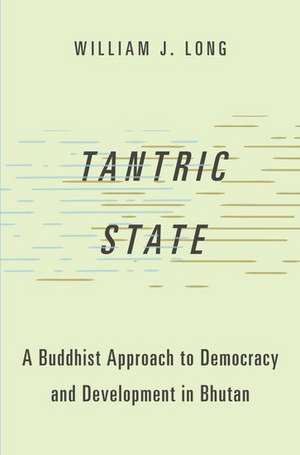Tantric State: A Buddhist Approach to Democracy and Development in Bhutan: Studies in Comparative Political Theory
Autor William J. Longen Limba Engleză Hardback – 7 feb 2019
Preț: 424.13 lei
Preț vechi: 586.73 lei
-28% Nou
Puncte Express: 636
Preț estimativ în valută:
81.20€ • 84.40$ • 67.32£
81.20€ • 84.40$ • 67.32£
Carte tipărită la comandă
Livrare economică 25-31 ianuarie 25
Preluare comenzi: 021 569.72.76
Specificații
ISBN-13: 9780190843397
ISBN-10: 019084339X
Pagini: 248
Dimensiuni: 236 x 163 x 23 mm
Greutate: 0.47 kg
Editura: Oxford University Press
Colecția OUP USA
Seria Studies in Comparative Political Theory
Locul publicării:New York, United States
ISBN-10: 019084339X
Pagini: 248
Dimensiuni: 236 x 163 x 23 mm
Greutate: 0.47 kg
Editura: Oxford University Press
Colecția OUP USA
Seria Studies in Comparative Political Theory
Locul publicării:New York, United States
Recenzii
William J. Long's Tantric State...is an excellent book...It seriously and profoundly employs and explains general Buddhism as paradigm, and it does so in outstanding, very erudite preliminary chapters that explain, better than any other recent work on Buddhist Economics for instance (my own included), what the Buddhist scriptural tradition here is.
"In our troubled times, Tantric State provides us hope with a Buddhist approach to holistic, sustainable, and democratic development. He makes Mahayana Buddhism accessible, and engages the reader to think creatively about how small Bhutan can teach the rest of the world to live with awareness of our interdependence with others and the planet. This inspiring book provides us with the know-how and the will to move beyond consumption to true happiness." Clair Brown, author of Buddhist Economics: An Enlightened Approach to the Dismal Science
"Tantric State is a carefully researched study of Bhutanâs daring experiment in blending democratic and Buddhist valuesâan experiment in political organization and policy-making premised on the reality of deep interdependence between humanity and nature and across generations, and the conviction that humane politics must privilege compassion over competition. Long looks critically under the hood of Bhutanese efforts to heighten âgross national happiness,â assessing their impacts over the decade since Bhutan made the worldâs first struggle- and violence-free democratic transition. But, he also holds the Bhutanese experiment up as a mirror in which to see our own political practices and prejudices from new angles. The view afforded by the Tantric State, in both directions, is revealing." Peter D. Hershock, author of Valuing Diversity: Buddhist Reflection on Realizing a More Equitable Global Future
"In Tantric State, Professor Long convincingly examines how a small state like Bhutan, with Buddhist influence, enabled itself to face the challenges of political transition without compromising the ethos of development. An excellent insight into the foundation of a happy and modern democracy."Rajesh S. Kharat, School of International Studies (SIS), JNU New Delhi
"In our troubled times, Tantric State provides us hope with a Buddhist approach to holistic, sustainable, and democratic development. He makes Mahayana Buddhism accessible, and engages the reader to think creatively about how small Bhutan can teach the rest of the world to live with awareness of our interdependence with others and the planet. This inspiring book provides us with the know-how and the will to move beyond consumption to true happiness." Clair Brown, author of Buddhist Economics: An Enlightened Approach to the Dismal Science
"Tantric State is a carefully researched study of Bhutanâs daring experiment in blending democratic and Buddhist valuesâan experiment in political organization and policy-making premised on the reality of deep interdependence between humanity and nature and across generations, and the conviction that humane politics must privilege compassion over competition. Long looks critically under the hood of Bhutanese efforts to heighten âgross national happiness,â assessing their impacts over the decade since Bhutan made the worldâs first struggle- and violence-free democratic transition. But, he also holds the Bhutanese experiment up as a mirror in which to see our own political practices and prejudices from new angles. The view afforded by the Tantric State, in both directions, is revealing." Peter D. Hershock, author of Valuing Diversity: Buddhist Reflection on Realizing a More Equitable Global Future
"In Tantric State, Professor Long convincingly examines how a small state like Bhutan, with Buddhist influence, enabled itself to face the challenges of political transition without compromising the ethos of development. An excellent insight into the foundation of a happy and modern democracy."Rajesh S. Kharat, School of International Studies (SIS), JNU New Delhi
Notă biografică
William J. Long is Professor in the Global Studies Institute and Department of Political Science at Georgia State University, and the former dean of the College of Arts and Sciences. He is the author of five books and numerous articles. Dr. Long is the recipient of research and teaching awards and grants from the Hewlett, Pew, Sloan, and MacArthur Foundations, the Fulbright Commission, the Carnegie Corporation, the European Union, and the U.S. Department of Education.




